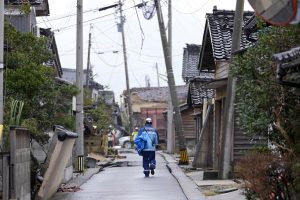Japan is in a state of shock after a passenger plane and a Coast Guard aircraft transporting aid to the earthquake-hit west Japan collided on the tarmac at Haneda airport in Tokyo on January 2. Five of the six Coast Guard member in the smaller plane died. All 379 passengers and crew on the Japan Airlines plane were evacuated safely, despite the aircraft bursting into flames on the landing strip.
The aviation accident came as the Coast Guard was attempting to deliver aid following a massive 7.6 magnitude earthquake that struck the Noto Peninsula in Ishikawa Prefecture on New Year’s Day. The earthquake could be felt from Tokyo, some 300 miles away. Japan has confirmed at least 62 deaths so far; rescue teams are rushing to find survivors trapped under toppled homes in freezing temperatures. The towns of Wajima and Suzu in Ishikawa Prefecture are worst affected, and local authorities says they are still assessing the full extent of the damage.
The Noto Peninsula earthquake also triggered Japan’s highest level tsunami warning for nine prefectures along the west coast, forcing 100,000 people to evacuate to higher ground. Most have returned to their homes to assess the damage. The Japan Meteorological Agency (JMA) has since downgraded the tsunami warning, but it is urging people to stay alert for tsunamis triggered by aftershocks. The JMA warned that a larger earthquake with a seismic intensity of 7 or greater could strike in two to three days. So far, more than 200 tremors have been felt since the quake on January 1.
At a press conference on January 3, Prime Minister Kishida Fumio said the government was prioritizing rescue as finding survivors was a race against time. He also stated that affected municipalities have requested more rescue dogs to help search for victims, immediate support to restore roads blocked by mud and sand, as well as water and blankets.
There have been reports of widespread damage to homes and essential infrastructure in Ishikawa and surrounding prefectures. In the coastal city of Suzu, Ishikawa Prefecture, it’s estimated that up to 5,000 families have been left homeless. Rescuers have also been battling blazes triggered by the earthquake. The Ishikawa prefectural government said 200 homes have burned to the ground.
The earthquake has also blocked and damaged roads, leaving some towns completely or partially cut off from emergency supplies. In Takayacho, Ishikawa, some residents are sleeping in their cars after the designated evacuation site was damaged. According to Japan’s public broadcaster NHK, these residents are running low on gasoline needed to keep their cars warm overnight. NHK aerial footage showed an SOS message made from broken tiles in a parking lot. But the fire department says poor road conditions are making it difficult for rescue vehicles to reach hard-hit towns.
There are also disruptions to electricity and water supplies. Across Ishikawa prefecture, tens of thousands of homes are without power. At least 14 towns are also waiting for Japan’s Self-Defense Forces to restore water, which remains cut off. Noto general hospital said it is urgently waiting for deliveries of water, and surgery and dialysis has also been suspended.
The Noto Peninsula earthquake is the strongest in Ishikawa Prefecture since records began. It is also the first time Japan’s highest tsunami warning has been issued since the devastating 2011 magnitude 9 earthquake and tsunami that killed more than 20,000 people.
World leaders have taken to social media to express their condolences. President Joe Biden said the United States was ready to help Japan. The leaders of Italy, Britain, Canada, France, and neighbors South Korea, the Philippines, and Taiwan expressed solidarity and support.

































